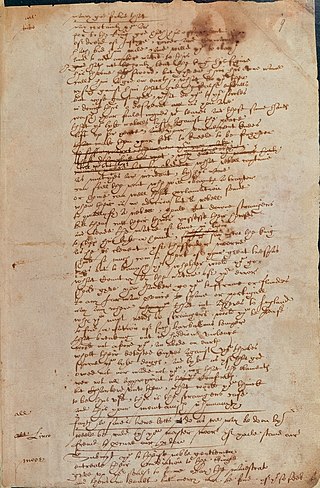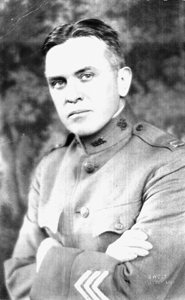Related Research Articles

Mr. William Shakespeare's Comedies, Histories, & Tragedies is a collection of plays by William Shakespeare, commonly referred to by modern scholars as the First Folio, published in 1623, about seven years after Shakespeare's death. It is considered one of the most influential books ever published.

Sir Thomas More is an Elizabethan play and a dramatic biography based on particular events in the life of the Catholic martyr Thomas More, who rose to become the Lord Chancellor of England during the reign of Henry VIII. The play is considered to be written by Anthony Munday and Henry Chettle and revised by several writers. The manuscript is particularly notable for a three-page handwritten revision now widely attributed to William Shakespeare.
Louis Booker Wright was an American author, educator and librarian.

William Manhire is a New Zealand poet, short story writer, emeritus professor, and New Zealand's inaugural Poet Laureate (1997–1998). He founded New Zealand's first creative writing course at Victoria University of Wellington in 1975, founded the International Institute of Modern Letters in 2001, and has been a strong promoter of New Zealand literature and poetry throughout his career. Many of New Zealand's leading writers graduated from his courses at Victoria. He has received many notable awards including a Prime Minister's Award for Literary Achievement in 2007 and an Arts Foundation Icon Award in 2018.

Ernst Badian was an Austrian-born classical scholar who served as a professor at Harvard University from 1971 to 1998.
Cyrus Henry Hoy was an American literary scholar of the English Renaissance stage who taught at the University of Virginia and Vanderbilt University, and was the John B. Trevor Professor of English at the University of Rochester. He wrote and published on a wide range of topics in English literature, though he is best known for his works on William Shakespeare, Beaumont and Fletcher, and other figures in English Renaissance theatre.

Foul papers are an author's working drafts. The term is most often used in the study of the plays of Shakespeare and other dramatists of English Renaissance drama. Once the composition of a play was finished, a transcript or "fair copy" of the foul papers was prepared, by the author or by a scribe.
Ralph Crane was a professional scrivener or scribe in early seventeenth-century London. His close connection with some of the First Folio texts of the plays of William Shakespeare has led to his being called "Shakespeare's first editor."
John Woodland "Jack" Welch is a scholar of law and religion. Welch is a member of the Church of Jesus Christ of Latter-day Saints and currently teaches at the J. Reuben Clark Law School (JRCLS) at Brigham Young University (BYU) in Provo, Utah, where he is the Robert K. Thomas University Professor of Law. He is notable for his contributions to LDS (Mormon) scholarship, including his discovery of the ancient literary form chiasmus in the Book of Mormon.
Michael O'Leary is a New Zealand publisher, poet, novelist, performer, and bookshop proprietor. He publishes under the imprint Earl of Seacliff Art Workshop, which he founded in 1984. He runs a bookshop with Irving Lipshaw, Kakariki Books, from the Paekakariki railway station.
Durant Waite Robertson Jr. was a scholar of medieval English literature and especially Geoffrey Chaucer. He taught at Princeton University from 1946 until his retirement in 1980 as the Murray Professor of English, and was "widely regarded as this [the twentieth] century's most influential Chaucer scholar".
Fredson Thayer Bowers (1905–1991) was an American bibliographer and scholar of textual editing.

Rodney Graham Downey is a New Zealand and Australian mathematician and computer scientist, an emeritus professor in the School of Mathematics and Statistics at Victoria University of Wellington in New Zealand. He is known for his work in mathematical logic and computational complexity theory, and in particular for founding the field of parameterised complexity together with Michael Fellows.

Hardin Craig was an American Renaissance scholar and professor of English. In his 65-year academic career, he served on the faculties of eight different colleges and universities, published more than 20 books as either author or editor, and was one of the few Americans to be elected to the Royal Society of Literature in Britain.

The International Institute of Modern Letters is a centre of creative writing based within Victoria University of Wellington. Founded in 2001, the IIML offers undergraduate and postgraduate courses and has taught many leading New Zealand writers. It publishes the annual Ōrongohau | Best New Zealand Poems anthology and an online journal, and offers several writing residencies. Until 2013 the IIML was led by the poet Bill Manhire, who had headed Victoria's creative writing programme since 1975; since his retirement, Damien Wilkins has taken over as the IIML's director.

Louis Decimus Rubin Jr. was a noted American literary scholar and critic, writing teacher, publisher, and writer. He is credited with helping to establish Southern literature as a recognized area of study within the field of American literature, as well as serving as a teacher and mentor for writers at Hollins College and the University of North Carolina at Chapel Hill; and for founding Algonquin Books of Chapel Hill, a publishing company nationally recognized for fiction by Southern writers. He died in Pittsboro, North Carolina and is buried at the Kahal Kadosh Beth Elohim Cemetery in Charleston, South Carolina.
George Thomas Tanselle is an American textual critic, bibliographer, and book collector, especially known for his work on Herman Melville. He was Vice President of the John Simon Guggenheim Foundation from 1978 to 2006.
Leonard Patrick Harvey was a British historian and professor. He held lectureships in Spanish at Oxford University (1956–58), Southampton (1958–60), and Queen Mary College, London (1960–63), was Head of the Spanish Department at Queen Mary College from 1963 to 1973 and Cervantes Professor of Spanish at King's College, London, in 1983, until his retirement in 1990.
Donald Francis McKenzie, FBA was a New Zealand bibliographer and literary scholar. He was professor of bibliography and textual criticism at the University of Oxford from 1989 to 1996.
Georg Bernhard Tennyson was an American scholar. He was emeritus professor of English at UCLA, a longtime editor of the journal Nineteenth-Century Literature, and a prominent scholar of Thomas Carlyle and Owen Barfield.
References
- 1 2 William Baker and Patrick Scott, Professor Trevor Howard-Hill: Shakespearean scholar known for his pioneering work in literary computing The Independent, August 3, 2011.
- 1 2 University of South Carolina -- University Libraries - News, Events & Exhibits Scholar Trevor Howard-Hill passes away. June 1, 2011.
- ↑ Forsyth, Jennifer. Cymbeline: Textual Introduction. Internet Shakespeare Editions.
- ↑ Howard-Hill, Trevor (1960). Spelling-Analysis and Ralph Crane: a Preparatory Study of His Life, Spelling, and Scribal Habits (Doctoral thesis). Open Access Repository Victoria University of Wellington, Victoria University of Wellington. doi: 10.26686/wgtn.16958434 .
- ↑ John Simon Guggenheim Memorial Foundation Archived 2014-07-23 at the Wayback Machine
- ↑ Eggert, Paul, and III, James L. W. West. 2011. “Remembrances.” Papers of the Bibliographical Society of America 105 (3): 290–92.